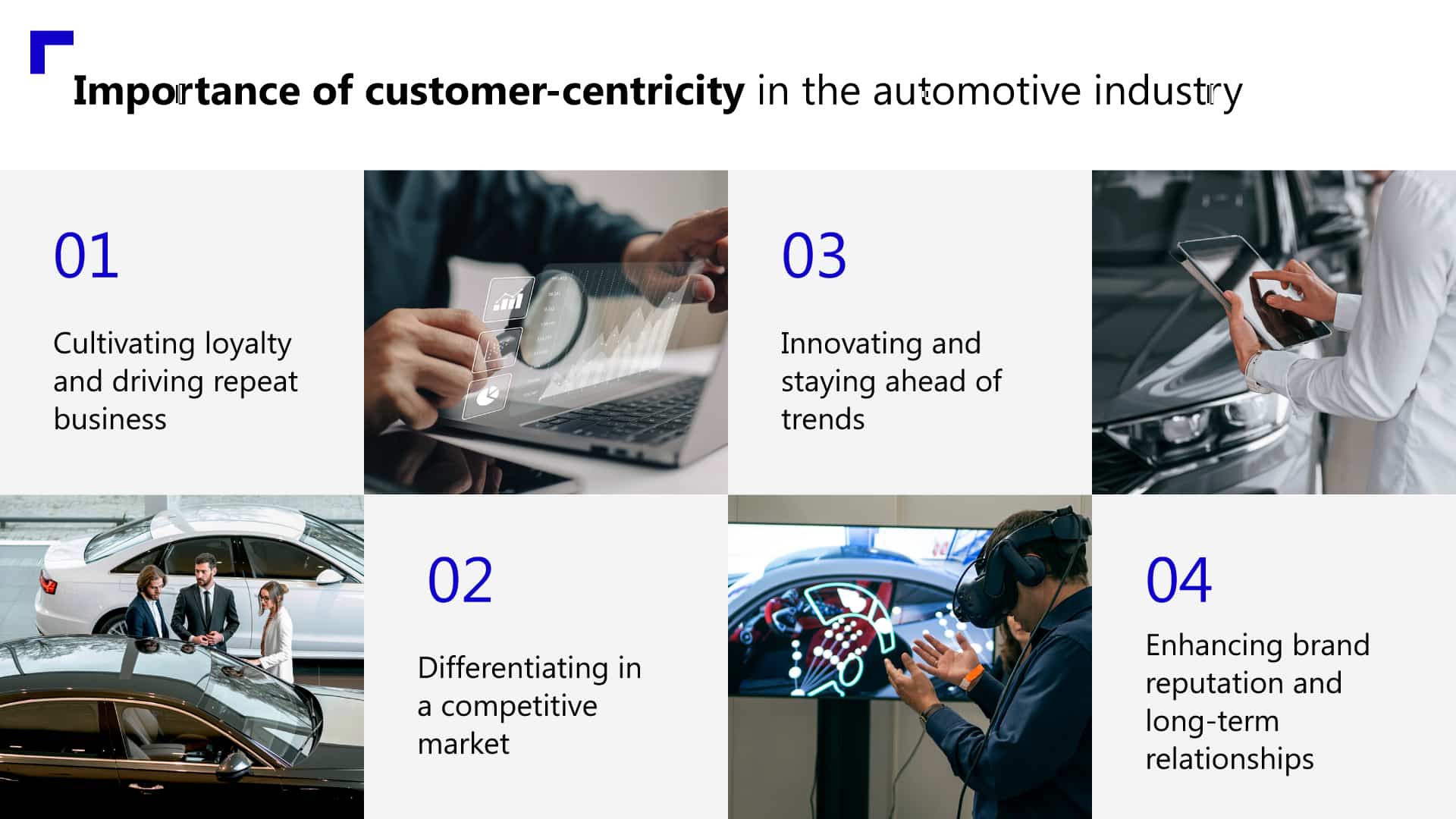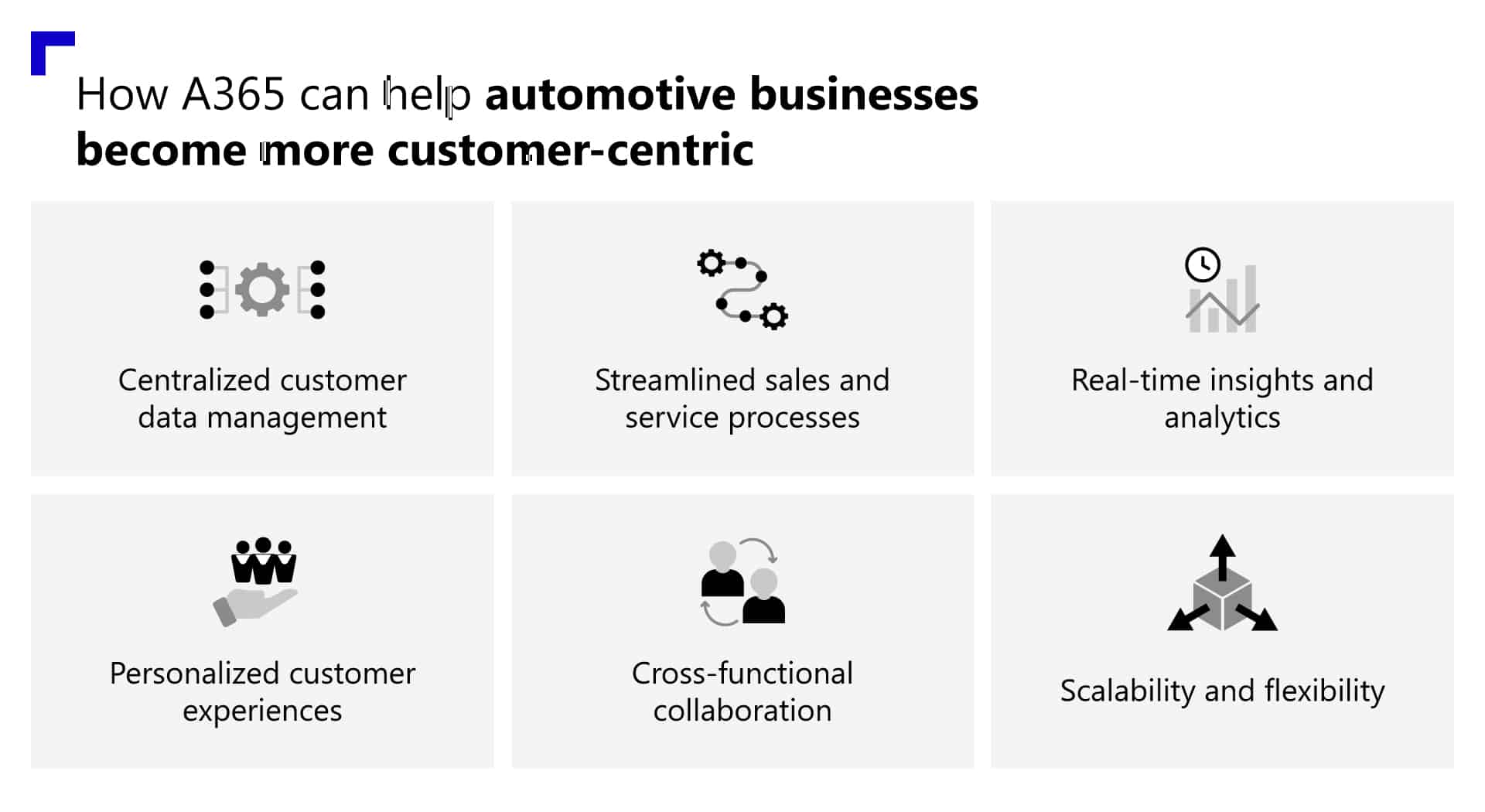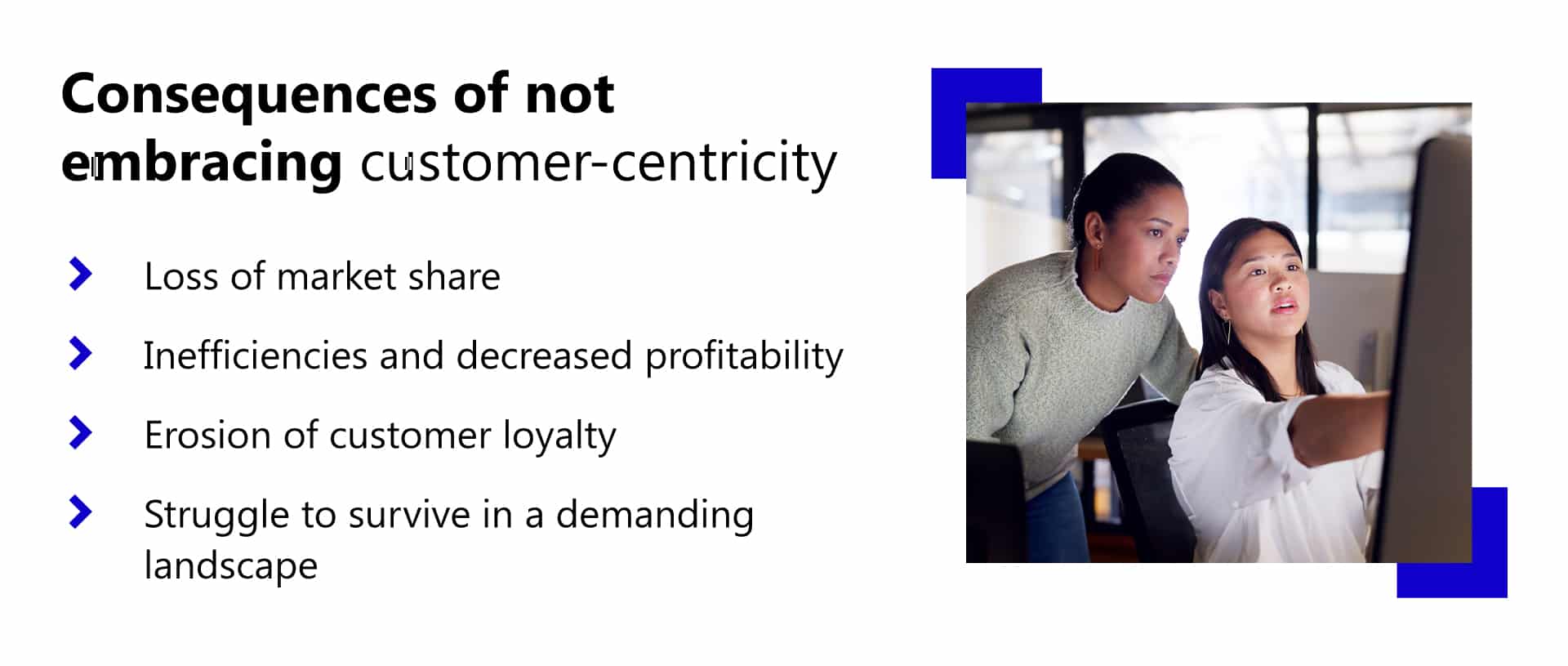What was once considered optional has become imperative for business success: seamless experiences, personalized services, and streamlined processes. Automotive businesses must pivot towards a customer-centric approach across all facets of their operations to effectively navigate this terrain.
Today’s consumers demand nothing short of seamless interactions at every touchpoint, from browsing to purchasing to post-sale support. They expect personalized services, whether it’s configuring their vehicle or receiving tailored recommendations for maintenance and upgrades. They anticipate frictionless processes and enhanced convenience, such as hassle-free financing options or efficient scheduling for service appointments.
To meet these elevated expectations, automotive businesses must integrate customer-centricity into their core values and operational strategies. This entails adopting a deep understanding of customer preferences and behaviors through data-driven insights and market research.
By leveraging technologies such as AI and big data analytics, businesses can anticipate customer needs and deliver proactive solutions before they even arise.
Importance of being customer-first in the automotive industry
Placing customers at the heart of their operations helps automotive businesses build strong connections beyond just sales. This means understanding not just what customers want, but why they want it, by exploring their motivations and needs.
Meeting customer preferences isn’t a one-size-fits-all deal. It requires understanding different customer groups and customizing experiences accordingly. Whether it’s giving personalized recommendations or offering great after-sales support, every interaction should be genuine and understanding.
By consistently providing exceptional experiences, automotive businesses can create loyal customers who value more than just the price or features of a product. Here are some reasons why prioritizing customer-centricity throughout the brand should be a top priority:

1.Cultivating loyalty and driving repeat business
- Prioritizing customer needs and preferences fosters a sense of loyalty among automotive customers, encouraging them to return for future purchases.
- By offering personalized experiences and attentive service, businesses can create emotional connections with customers, further solidifying their loyalty.
- Repeat business not only contributes to revenue growth but also serves as a testament to the effectiveness of a customer-centric approach in building lasting relationships.
2.Differentiating in a competitive market
- Standing out from competitors is crucial for success in a crowded automotive market.
- By focusing on customer needs and delivering exceptional experiences, businesses can differentiate themselves based on the value they provide rather than just the products they offer.
- Differentiation through customer-centricity builds a unique brand identity that resonates with consumers and sets businesses apart from competitors.
3.Innovating and staying ahead of trends
- Understanding customer insights allows businesses to anticipate market trends and consumer preferences, enabling them to innovate proactively.
- By staying attuned to customer needs, businesses can develop innovative products and services that address unmet demands, positioning themselves as industry leaders.
- Innovation driven by customer-centricity not only attracts new customers but also retains existing ones by continually offering value-added solutions.
4.Enhancing brand reputation and long-term relationships
- Consistently prioritizing customer needs and delivering exceptional experiences enhances brand reputation, earning businesses the trust and loyalty of customers.
- Positive word-of-mouth referrals from satisfied customers are powerful endorsements, further bolstering brand reputation and attracting new customers.
- Building long-term relationships with customers fosters loyalty and ensures sustained success, as loyal customers are more likely to advocate for the brand and remain loyal even in the face of competition.
The need for processes to be customer-centric
Processes serve as the backbone of any organization, dictating how work is performed, resources are allocated, and objectives are achieved. In the automotive industry, customer-centric processes are essential for delivering seamless and personalized experiences at every touchpoint.
By aligning processes with customer needs and preferences, businesses can streamline operations, reduce inefficiencies, and enhance overall customer satisfaction. From sales and marketing to manufacturing and after-sales service, customer-centric processes ensure consistency, reliability, and excellence throughout the customer journey.
How A365 can help automotive businesses become more customer-centric
Annata’s A365 solution, built on top of Microsoft technologies like Dynamics 365, offers a comprehensive set of tools and capabilities designed to empower automotive businesses to become more customer-centric. Here’s how A365 can help:

1.Centralized customer data management
- A365 provides a centralized platform for managing customer data, allowing automotive businesses to consolidate information from various sources such as sales, marketing, and service interactions.
- Businesses gain a holistic view of their customers’ preferences, purchase history, and service interactions, enabling them to personalize their offerings and interactions effectively.
2.Personalized customer experiences
- With A365, automotive businesses can leverage customer data to deliver personalized experiences across all touchpoints.
- By analyzing customer insights and preferences, businesses can tailor marketing messages, promotions, and product recommendations to individual customers, increasing engagement and satisfaction.
3.Streamlined sales and service processes
- A365 streamlines sales and service processes, enabling automotive businesses to deliver efficient and responsive service to customers.
- From sales order processing to service appointment scheduling, A365 automates workflows, reducing manual errors and delays while ensuring consistent service delivery.
4.Cross-functional collaboration
- A365 facilitates cross-functional collaboration by providing a unified platform for teams across sales, marketing, service, and operations.
- By breaking down silos and fostering collaboration, A365 enables teams to share customer insights, coordinate efforts, and deliver a cohesive customer experience across all departments.
5.Real-time insights and analytics
- A365 offers powerful analytics and reporting capabilities, providing automotive businesses with real-time insights into customer behavior, market trends, and business performance.
- By leveraging these insights, businesses can make data-driven decisions, identify opportunities for improvement, and optimize their customer-centric strategies for maximum impact.
6.Scalability and flexibility
- A365 is built on Microsoft Dynamics 365, a flexible and scalable platform that can grow and evolve with the needs of automotive businesses.
- Whether businesses are small startups or large enterprises, A365 can be tailored to meet their specific requirements, ensuring scalability and flexibility as they expand and innovate.
Consequences of not embracing customer-centricity
Failure to embrace customer-centricity can have dire consequences for automotive businesses, significantly impacting their ability to thrive in a competitive market. This includes:

1.Loss of market share
- Businesses that fail to prioritize customer needs risk losing market share to competitors who excel in delivering personalized experiences.
- Without understanding and addressing customer preferences, businesses may struggle to attract and retain customers, leading to a decline in market share over time.
- Competitors who actively engage with customers, anticipate their needs, and provide tailored solutions are likely to capture a larger share of the market, leaving customer-centric businesses behind.
2.Inefficiencies and decreased profitability
- Stagnant processes and outdated systems hinder operational efficiency, resulting in inefficiencies and delays throughout the business operations.
- Inefficient processes not only increase operational costs but also compromise the quality and timeliness of products and services delivered to customers.
- Ultimately, these inefficiencies lead to decreased profitability as businesses incur higher costs without commensurate returns, impacting their long-term viability.
3.Erosion of customer loyalty
- Customer loyalty is essential for sustaining long-term success in the automotive industry. Businesses that fail to prioritize the customer experience risk losing loyal customers to competitors who offer superior service and engagement.
- When customers feel overlooked or undervalued, they are more likely to seek alternatives, eroding the business’s customer base and diminishing its revenue streams.
- Without a strong foundation of loyal customers, businesses may struggle to maintain consistent sales and revenue, making it challenging to sustain profitability over time.
4.Struggle to survive in a demanding landscape
- In today’s dynamic market, where consumer preferences and expectations evolve rapidly, businesses must continuously adapt to remain competitive.
- Failure to prioritize customer-centricity leaves businesses vulnerable to disruption, as competitors who embrace innovation and customer-centric strategies gain a competitive advantage.
- Automotive businesses that neglect the customer experience risk falling behind competitors and may find it challenging to survive in a landscape characterized by relentless change and intense competition.
Is your business truly customer-first? Start your journey towards becoming a customer-centric business today with A365. Reach out to us to begin your journey towards customer-centric excellence.





